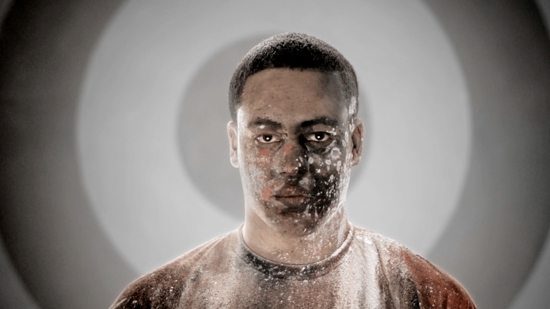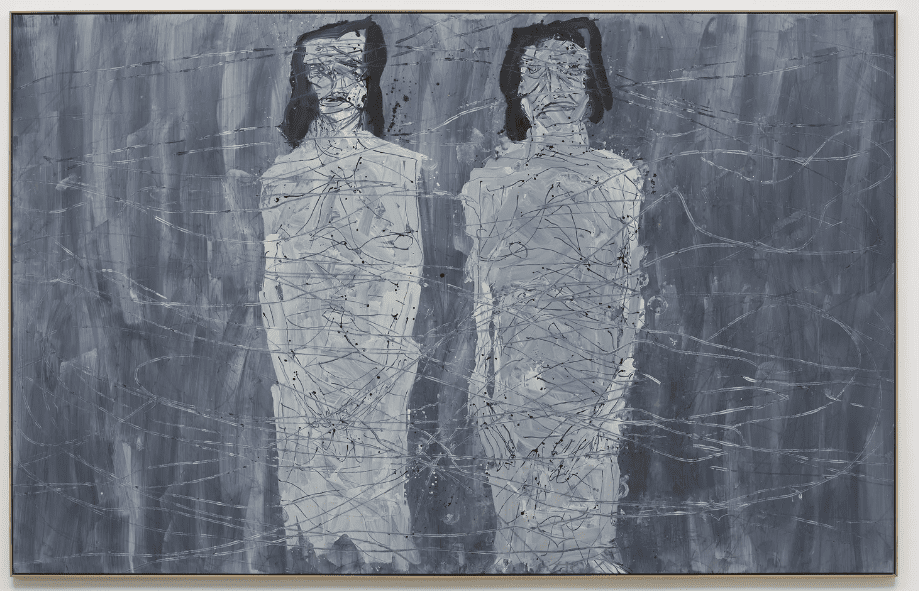Fear, righteous anger, too much booze and a boldly-drawn emotional vision, this debut from Dels wraps the disorientation of over-intelligent urban British youth into forty minutes of poetic and musical innovation.
This may not be the debut of the past decade. It may not be the freshest, most visceral and intelligent new voice in British hip-hop, or the most exciting record in the genre since Run Come Save Me, but if it’s not, it’s as close as dammit.
Roots Manuva, Ghostpoet. There, let’s mention them – their names will just be hanging awkwardly in the periphery of the mind otherwise. Whilst the wider world gradually comes the the late realization that Run Come Save Me was about the most exciting record of the noughties, the music press frantically expends ink and spleen on the all-pervasive hunt for the ‘next Roots Manuva’. Relax, there’s no need. The original is still as swaggeringly incisive as ever, (on this, more later). No-one, not even Ghostpoet, will be more often referred to as ‘the new Roots’ more often than Dels. Sharing the same label; the same short-circuited lancet-like intelligence; the same accent – the blogosphere will likely crash under the repetition of the phrase when the record is released, which is unfortunate because the overlaps are superficial. What Dels brings to the hip-hop lexicon is an absence of arrogance. Self-doubt, insecurity, vulnerability. Add that to the pre-established qualities of righteous anger, earnest energy and avenging-angel fire that typify Big Dada releases and you have an intriguing artist and vision. It is intoxicating stuff.

There is self-loathing, the exasperation of a life not lived to its full potential and the self-hate perpetuating solace of binge-drinking. ‘Am I still drunk? Evidently’. In a genre typified by the tedious crotch-grabbing of poseurs bleating constantly about their ‘prowess’ at attracting women with their money, and without even the wit to see the soul-destroying potential of that measure of self-worth, Dels drops the pretence of competitive happiness. Where another lyricist would be happy with an observation, he brings it to brilliance. There’s nothing new in the opening minutes of the album – a standard run-down of the narrator’s verbal dexterity, vocabulary and flow: standard practice in hip-hop credential-establishment. Until, suddenly, the track breaks down into :
I can’t keep drifting along, working extra long hours in this dead end job
Fifteen minute break, working minimum wage
Manager’s in my face, when he shouts his praise I’m like….
Could this water turn to wine, so I can build the courage and vent my mind?
Brilliant observation. The wasted potential of capable youth, the drudgery of menial routine – these things can be accepted, but the patronising redundancy of being praised for doing a facile task well, that’s the killer. Nor is the escapism glamorous or exclusive – it’s nothing more than the empty anaesthesia of the bottle. So honest and bleak, an expression that is so much more dangerous and destabilizing than the opiate hip-hop dream of rapping your way out of the ghetto and into an MTV crib. It is an England in which the soul-destruction of shitty jobs, lottery tickets and binge-drinking unite the Big Society’s losers more cohesively than race or creed. That’s an expression of defeated youth as incomprehensible to JayZ as to David Cameron. In this, Dels draws more deeply from the distopia of Billy Bragg or The The than from any more obvious hip hop heritage. That said, the overwhelming political disaffection, offset beats and British cultural references (Only Fools and Horses, Doctor Who) make it impossible to banish Roots Manuva’s Witness (One Hope) from the background. The domestic references continue throughout, an acknowledgement that this disenfranchisement of youth, of wasted potential is cross-generational, nothing new. If that isn’t a reference to Soft Cell’s ode to domestic defeat Kitchen Sink Drama that we hear as the soundbed for Droogs, then the fact that it sounds so close is serendipity indeed.
Dels’ delivery ranges from the aggro, provocative spitting that is typical of hip-hop emcees when they bluster about social issues, to a quieter, introspective persona that is a thousand times more intriguing and engaging. Sometimes all it takes is a whisper. DLR, a tableau of sodden London, focussed on a homeless woman crouched in a doorway, shows us what Dels can do – toning down the imagery of dizzy drunkedness and glitched bit-hop riddims for a moment to offer a glittering fantasy of escape with etheral cameo vocals from Elan Tamara. The album is not all perfect though. Droogs, a tale of sexual abuse and domestic violence, unfortunately suffers from the more forceful version of Dels’ delivery. It’s a horrible subject, and he tackles it well, but feels like he uses the more percussive aspects of his voice to push it away from himself, rather than engage intimately with the track. The imagery is visceral and disturbing, his anger righteous. It is a courageous attempt, but either because the subject is too tender for Dels to examine it closely, or because it was no more than an exercise in painting a disturbing picture, he doesn’t do it the justice of the intelligent, upside-down treatment that by this stage in the album (track 10), we know he is capable of. Instead, a certain immaturity of treatment gives it the unhealthy pallor of crisis-voyeurism. It becomes a horror film, not a psychological thriller. The really observant will hear echoes of the Clockwork Orange soundtrack in the opening bars, and will make the connection to the track’s title.

On lyrical imagery alone, the album should be bleak. The clinical precision of the beats and textures on the production elevate the sense of being lost and confused, making that hopelessness even more stark. The frustration and angst of Roots Manuva’s Run Come Save Me is discernable throughout, but unlike that earlier album, there is no Dreamy Days, no sense of ‘once I get this album made, we’ll be out of this desolation’. And he’s right, in this age of filesharing and Spotify, making a savagely brilliant album is no guarantee even of a modest income. Dels knows this – he’s signed to the same label as Speech Debelle was, after all. So instead of rhyming about Bentleys and Courvoisier, it’s on lottery tickets where the scant expressions of hope are (overtly) focussed.
So what about the Roots Manuva cameo? Rodney Smith’s shadow hangs heavily over the album from track one. Sonically, the disquieting keyboard chords of Roots Manuva are a constant reference, albeit with newer beats that are so talkative and laden with expression that they could quite easily justify an album of their own. Smith’s voice finally comes wading in on Capsize, with a piratical swagger and a heavyweight punch that is almost jarring after the rapier-work of the introspective version of Dels:
Looks like we’re all fucked, no lube.
Cameron better steer clear of my arse
kick down the doors of parliament for the truth
It’s painted with a bold hand, a bludgeon at times but righteous nonetheless. Iraq, unemployment, overzealous policing – all the malaise of British youth, as apt now as it was in the Thatcher era. Big Dada’s promotional materials present the song as a modern-day Ghost Town, but the eighties references don’t stop there – Hot Chip’s Joe Goddard produces, washing the track with Dave Ball-style synth chords that come straight off Exotic Cabaret-era Soft Cell. Anyone who lived through the Thatcher years has already looked at Britain now and seen an unhealthy resemblance – it’s gratifying to know that the observation isn’t lost on Dels. It will be interesting to see how this track is received, should it be released as a single. Some years ago the ever-elusive SubMachena recorded a political song (Stand Down Tony) with Roots Manuva’s other emcee – Ricky Ranking. The track was refused BBC airplay on account of being ‘too political’. It remains to be seen whether times have changed enough to get Capsize the recognition it deserves.
Bleak and stark social realism are too much, in themselves, to elicit a response in the listener though. After a while, even the most conscious audience wanders into escapism. In this album we have spiked drinks, nascent alcoholism, an uncaring state, child abuse, police brutality, it goes on. On the face of it, listening to the lyrics alone, there is no relief from the miasma, no hope. Until, listening a few times, the hope becomes apparent. As with everything about Dels at his best, it is subtle and hidden. The real hope is wrapped up in his fiery defiance and fight. It is in the anger, and the analysis, and his irksome refusal to settle into the role of drunken, dysfunctional (but docile) wasted humanity that has been allocated to him.
I won’t get swallowed by the gob
Swallowed by the darkness
Swallowed by the fog
Because of that, this is a record that is so much more dangerous to the society he attacks than any amount of full-frontal ‘Fuck da police’ bluster and confrontation. Don’t leave this one for a decade before you realize how good it is.
Released May 2, 2011 on Big Dada/ NinjaTune
Second picture by Chloe Hayward.

An observer first and foremost, Sean Keenan takes what he sees and forges words from the pictures. Media, critique, exuberant analysis and occasional remorse.


















